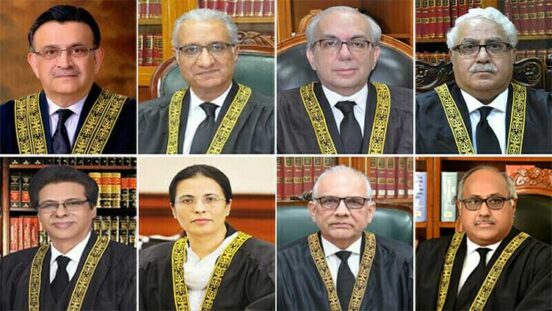ISLAMABAD -UNS: An eight-member larger bench of the Supreme Court (SC) on Monday grilled Attorney General of Pakistan (AGP) Mansoor Usman Awan over the government’s plea to form a full court to hear a set of petitions against a law aimed at limiting the powers of the chief justice of Pakistan (CJP).
The bench comprised CJP Umar Ata Bandial, Justice Ijazul Ahsan, Justice Munib Akhtar, Justice Mazahar Ali Akbar Naqvi, Justice Muhammad Ali Mazhar, Justice Ayesha Malik, Justice Syed Hasan Azhar Rizvi and Justice Shahid Waheed.
At the last hearing on May 2, CJP Bandial had sought the record of National Assembly (NA) proceedings from when the bill, which has since become an act of Parliament, was deliberated upon by the House.
The bench had directed the attorney general for Pakistan (AGP) to furnish copies of the proceedings of the standing committee and the House “to understand the concerns and views of the lawmakers while passing the bill”.
The CJP had also put the Pakistan Bar Council’s (PBC) request for a full court aside, observing that it would be considered again during the next hearing.
Subsequently, the government requested the SC to form a full court to consider important questions regarding the judiciary’s independence and parliament’s powers to regulate the court’s procedure. Separately, the government also asked the court to dismiss the challenges to the law.
Prior to today’s hearing, the PML-N also submitted a plea requesting the formation of a full court to hear the case.
Today’s hearing
At the outset of today’s hearing, AGP Awan informed the court that a plea had been filed for the formation of a full court to hear the case. “The PML-N has also filed a petition for the formation of a full court,” he said.
Justice Ahsan noted that the government’s plea had not yet been fixed for hearing. He then asked the AGP whether the documents sought by the court at the previous hearing had been submitted.
Awan replied that he expected to receive the record of parliamentary proceedings by tomorrow and had also contacted the NA speaker in this regard.
“The judiciary’s independence is a fundamental element of the Constitution,” the AGP added. He said that the law in question had set out the procedure for constituting benches as well as dealing with appeals.
“The matters decided in the law are administrative in nature,” he said, arguing that the SC’s rules were formulated by a full court.
He said that decisions and cases concerning the judiciary’s independence and rules should involve a full court, adding that the law would also be applicable on judges that were not hearing the case.
Justice Ahsan, however, said that the matter at hand concerned the power to legislate and not changes to the SC rules. “Various benches have been routinely hearing cases relating to legislative powers,” he said.
At this point, Justice Naqvi asked if such a law had been enacted in the past. The AGP responded by saying that the president’s permission was required for making rules until 1973.
Justice Naqvi then asked how such a law could be passed when Article 191 of the Constitution was present.
Article 191 states the following: “Subject to the Constitution and law, the SC may make rules regulating the practice and procedure of the court.”
The AGP contended that such a case had not been filed in the past and, therefore, a full court should be constituted.
“Many cases are the first of their kind. Any of the Supreme Court’s benches can hear any case,” Justice Malik said. She also questioned whether the government wanted to avail the “advantage” of a full court.
She then questioned whether the government wanted the top court’s internal discussions to come out in the open. “Every case is important. How can it be determined whether a full court should hear a [particular] case? Did a full court hear every case related to the judiciary’s independence?” she asked.
She also asked whether the AGP was trying to say that the nation had demanded a full court. “How can the court regulate proceedings at the whims of the petitioner?” she questioned.
The AGP conceded that a full court had not heard every case related to the judiciary’s independence but highlighted that several cases, including the Iftikhar Chaudhry case, were heard by a full court.
“The Iftikhar Chaudhry case was of a different nature,” Justice Naqvi said.
Justice Akhtar then stated that the full court had the power to formulate rules for administrative matters. “If a case concerning the [SC] rules comes up before a three-member bench, should that also be heard by a full court?” he asked.
Justice Malik went on to state that the AGP’s argument was “beyond comprehension” as it indicated that a decision made by a full court was good and one made by a three-member bench was bad.
Justice Ahsan then asked whether the AGP was trying to say that since a full court constituted these rules then it should also interpret them. He observed that under the new law, a five-member bench would hear cases concerning the Constitution’s interpretation.
The AGP stated that the top court had barred the government from implementing the law.




